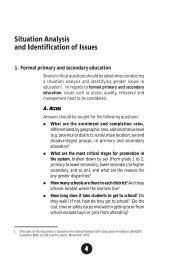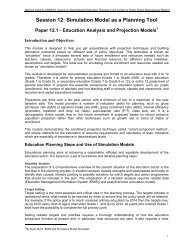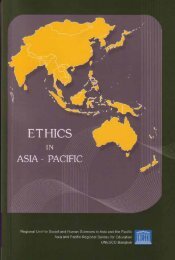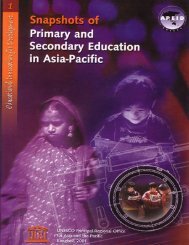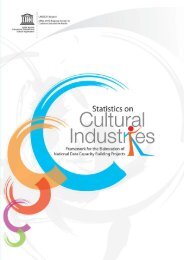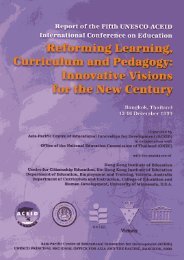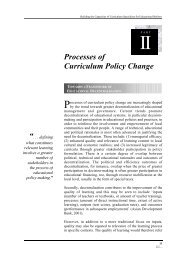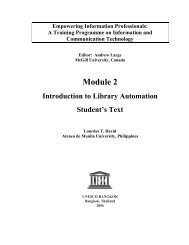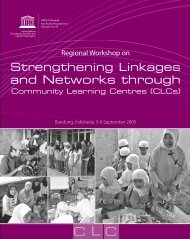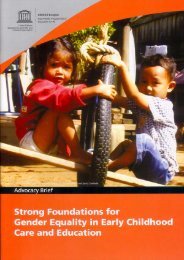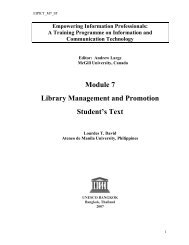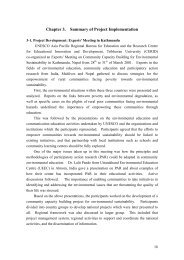Educational Finance in Thailand - UNESCO Bangkok
Educational Finance in Thailand - UNESCO Bangkok
Educational Finance in Thailand - UNESCO Bangkok
Create successful ePaper yourself
Turn your PDF publications into a flip-book with our unique Google optimized e-Paper software.
F<strong>in</strong>al Report, Volume II/3 Anthony. Cresswell: <strong>Educational</strong> <strong>F<strong>in</strong>ance</strong> <strong>UNESCO</strong>-PROAP TA 2996-THA<br />
Education Management and <strong>F<strong>in</strong>ance</strong> Study July 1999<br />
e. The management of teacher transfers at the prov<strong>in</strong>cial level is desirable from<br />
the po<strong>in</strong>t of view of decentralization, but it does <strong>in</strong>volve problems as well.<br />
Exist<strong>in</strong>g policies give the prov<strong>in</strong>cial officers authority to adjust the allocation of<br />
teachers among the schools and to control transfers. Teachers mov<strong>in</strong>g <strong>in</strong>to a<br />
prov<strong>in</strong>ce are <strong>in</strong>itially assigned by prov<strong>in</strong>cial officials. So an <strong>in</strong>itial assignment can<br />
be used to remedy shortages if sufficient teachers are available for assignment.<br />
However, after two years, teachers are allowed to transfer if the receiv<strong>in</strong>g school<br />
has an open<strong>in</strong>g, or after one year if the teacher arranges for an exchange <strong>in</strong><br />
positions with a teacher from the other school. These requests for transfers require<br />
approval by a committee at the prov<strong>in</strong>cial level.<br />
f. Us<strong>in</strong>g adm<strong>in</strong>istrative controls to achieve equitable distribution of teachers is<br />
unlikely to produce the desired result. Prov<strong>in</strong>cial officials already have the<br />
nom<strong>in</strong>al authority to achieve an equitable distribution or meet certa<strong>in</strong> critical local<br />
needs. S<strong>in</strong>ce prov<strong>in</strong>cial officers are closer to the schools and more familiar with<br />
these circumstances, it is reasonable to locate some decision-mak<strong>in</strong>g authority at<br />
that level of the system. However, these officials readily admit that<br />
maldistribution rema<strong>in</strong>s a serious problem. In exercis<strong>in</strong>g these adm<strong>in</strong>istrative<br />
controls, they must balance the needs of particular schools with the demands of<br />
teachers for more desirable assignments. There can be considerable pressure from<br />
<strong>in</strong>dividual teachers to move to more desirable schools. The less desirable schools<br />
typically have poor facilities and liv<strong>in</strong>g locations are also most likely to be remote,<br />
or high poverty, or otherwise disadvantaged. In some areas, such as the hill tribe<br />
regions, the remote school populations may <strong>in</strong>clude large concentrations of ethnic<br />
or language m<strong>in</strong>ority children. Such assignment may be very undesirable for<br />
teachers from other areas or backgrounds. If allocations and transfers are<br />
responsive to these teacher preferences, the result can re<strong>in</strong>force and exacerbate<br />
already serious <strong>in</strong>equities.<br />
g. However, prov<strong>in</strong>cial officials cannot ignore teacher preferences either. A<br />
teacher that is unhappy with the work<strong>in</strong>g and liv<strong>in</strong>g conditions is not likely to be<br />
very effective. Neither are large cultural differences between teachers and students<br />
conducive to effective <strong>in</strong>struction. For example, Chiang Mai prov<strong>in</strong>cial officers<br />
reported that Hill Tribe children often have difficulty understand<strong>in</strong>g the accent of<br />
teachers from other regions. Moreover teachers required to work <strong>in</strong> undesirable<br />
locations are more likely to seek other employment and leave teach<strong>in</strong>g as well.<br />
Therefore ma<strong>in</strong>ta<strong>in</strong><strong>in</strong>g some balance of teacher preferences with school needs is<br />
necessary. What is needed are means to tip that balance <strong>in</strong> favor of the schools and<br />
children with the most press<strong>in</strong>g needs.<br />
h. Changes <strong>in</strong> the f<strong>in</strong>ancial and budget policies may provide some leverage to tip<br />
the balance <strong>in</strong> the desired direction. F<strong>in</strong>ancial and budget arrangements can be<br />
used to provide greater <strong>in</strong>centives for teachers to work <strong>in</strong> otherwise less desirable<br />
schools. More prov<strong>in</strong>cial and local discretion over salary budgets could allow<br />
some schools to become more desirable by offer<strong>in</strong>g higher salaries or other<br />
f<strong>in</strong>ancial <strong>in</strong>centives. Some prov<strong>in</strong>cial officials were skeptical that such <strong>in</strong>centives<br />
would have large effects. But s<strong>in</strong>ce they have not been seriously attempted, such<br />
<strong>in</strong>centives may prove to have positive results. Prov<strong>in</strong>cial officials also reported<br />
that school pr<strong>in</strong>cipals deliberately compete for teachers by seek<strong>in</strong>g donations and<br />
49



